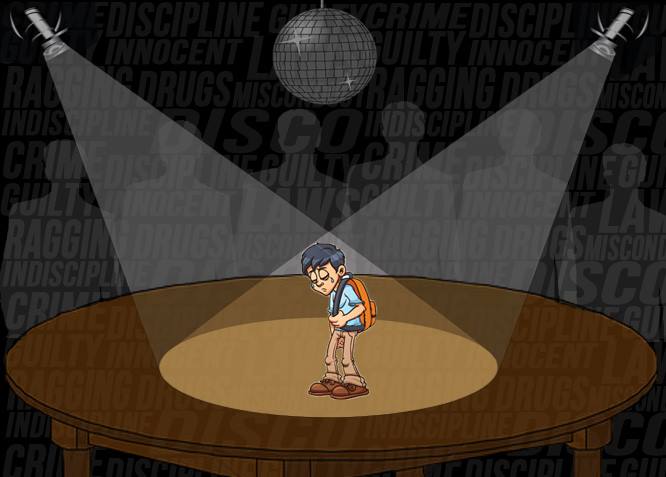DisCo
Written on April 25th, 2018 by {"login"=>"jcbitshyd", "email"=>"journal@hyderabad.bits-pilani.ac.in", "display_name"=>"Journal Club, BPHC", "first_name"=>"", "last_name"=>""}The Disciplinary Committee, or DisCo for short, is something which
intrigues most students on campus. For some, coming under the purview of
it is a nightmare come true, while for others, it is a badge they wear
with pride, something ‘cool’. But strangely, for something so important,
there exists virtually no information about the process, and its
workings. This article aims to detail all of this as comprehensively as
possible.

The Committee
The Committee consists of 6 members: the Associate Dean of the
Students Welfare Division (who acts as the convener of the Committee),
the Chief Warden, two teachers and two student representatives. The
student representatives are picked by the Students’ Union Council and
vetted thoroughly by the SWD Associate Dean in terms of their academic
and disciplinary record and other students’ opinion of them, before
being approved by the Senate. In order to maintain gender equality,
there is always one male student and one female student in the
Committee. All members of the Committee have equal say and the majority
decision is enforced.
The Committee members receive no payment or benefits for their work
as it is considered part of their usual academic duties. Moreover, it is
important to note that the Disciplinary Committee only recommends the
course of disciplinary action to be taken. The final decision is taken
by the Administration. This ensures a completely fair process, with no
place for personal issues being a factor in decision making.
The Procedure
Any case of indiscipline, or violation of rules is first reported to
the respective Hostel Warden by the Hostel Superintendent. (Note: The
Hostel Wardens are the Professors in-charge of the hostel, while the
superintendents are the ones in the hostel office.)
The Hostel Warden then informs the Chief Warden and the Associate
Dean of the SWD who determine the seriousness of the violation. The
student is summoned and questioned with regards to the incident, and
they are given a chance to defend themselves. If the student admits
guilt, then a Committee meeting is convened to determine the further
course of action. On the other hand, if the student insists that they
are innocent, the Superintendents are asked to submit proof of the
student’s guilt. If they fail to provide sufficient proof, the student
is given the benefit of the doubt and let go.
After this step, in case guilt is proved, the Committee convenes to
decide the student’s punishment. There is a set of standard guidelines
laid down by the Administration detailing every offence and the
punishment for the same. For first-time offenders, these guidelines are
usually followed strictly. However, for repeat offenders, stricter
action is taken, depending upon the gravity of the offence and the
general conduct of the concerned student. There are various levels of
punishment, varying from just a warning to fines to suspension for a
semester or a year too, and in extreme cases, expulsion from the
institute.
The Fine
A general misconception among most students is that the money
collected as the fine goes to the Administration, which would construe a
conflict of interest. However, this is not so. The money actually goes
to the Student Aid Fund (SAF) which helps students in need. Hence, all
the money collected through disciplinary action is used for the students
themselves.
Punishment or Correction?
The intention of the Disciplinary Committee is not to ruin students’
lives by giving excessively harsh punishments. The aim of the Committee
is to serve as a correctional measure for the students. They believe
that it is not unusual for students at this age to feel the urge to
explore such experiences, and their job is prevent students from going
overboard. Hence, the punishments for first-time offences are usually
fines instead of cancelling registration, as these pinch the students
and teach them a lesson, but do not ruin their future.
However, this definitely does not mean that first-time offenders will
be granted any leniency or be allowed to get away. Moreover, students
who have faced disciplinary action are not allowed to hold any positions
of responsibility for a year and not allowed to avail institute
scholarships. Hence, one must keep this in mind before getting
themselves into situations that could potentially ruin their future.
Special thanks to Sandip S Deshmukh sir and Amitesh Soni for taking
the time out to answer all our questions and doubts regarding this
topic.
Reference(s):
The link to the guidelines: https://goo.gl/Pxjgm4
Article by Kushagra K Chanda and Soham Majumder
Originally published on 24th September, 2017 on BITS Chronicles.